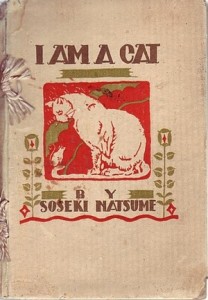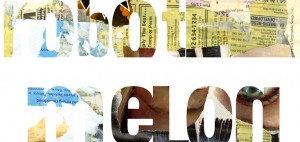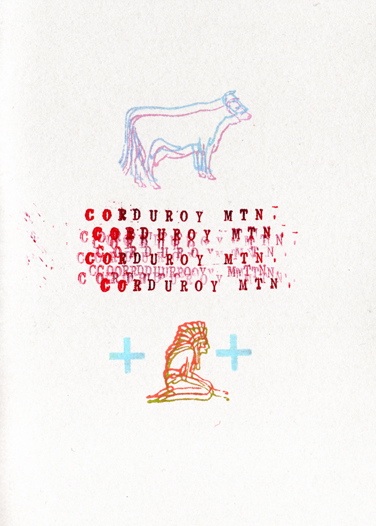I like “I Am a Cat” a lot
 I Am a Cat was written by japanese author Natsume Soseki in 1906. Its clear, taut prose is notably ‘modern’ for its time. I was affected by its writing more than other books — not just in part due to the unlikely cat narrator — but what it taught me: the best satire is born of compassion. After the following excerpts, I will try to explain what I mean.
I Am a Cat was written by japanese author Natsume Soseki in 1906. Its clear, taut prose is notably ‘modern’ for its time. I was affected by its writing more than other books — not just in part due to the unlikely cat narrator — but what it taught me: the best satire is born of compassion. After the following excerpts, I will try to explain what I mean.
Excerpt:
I hear that, on occasion, this species catches, boils, and eats us. However as at that time I lacked all knowledge of such creatures, I did not feel particularly frightened. I simply felt myself floating in the air as I was lifted up lightly on his palm.
This is early on in the book, where Soseki quickly establishes the satirical tendency throughout the novel. There is a certain rationality that comes easily for the cat, who gains the reader’s authority.
On hearing the front bell (after the break):
John Updike dies at 76
He was poked fun of by a new generation of agitated ‘post-everything’ writers and critics — but he was a great writer. His “The Early Stories, 1953-1975” exemplified, for me, how writing ought to sound in the ear when being read. I had a good time with him.
Rest in peace John.
Dumbshit guidelines

Apt is a beautiful journal which I will never submit to because they – like a good handful (hugful?) of journals – destroy any inspired feeling of goodwill or camaraderie upon reading their somewhat self-obsessed guidelines. What follows after the break are their submission guidelines with light commentary from me.
The Lives of Others: at the art opening
Mike Young came to San Francisco a few weeks ago. We didn’t document the experience, but it just so happened that we were ‘in the way’ while a picture was being taken for a website that documents SF art openings (scroll down to Rosenthal Gallery).
Anyway, in the vein of Selections from the Giant family photo album, I figure I’d consolidate our conversation into four snippets. Out of modesty and restraint, the photos are after the break.
My Issue with Issuu

Issuu’s slick yet invariably muffled interface aims to mimic the printed page with ‘animated page flipping’ and rendering the shadowed contours of a flayed open book/magazine. Such dramatic flourishes beg the question: what the fuck?
In order to actually read the words, one needs to zoom in, an experience likely to induce vertigo spells. The lightest tap on your cursor will throw your eye over a vast terrain of ‘zoomed in’ space to another part of the book, abandoning it from the context usually established by peripheral vision. (Imagine having your nose to a page then getting hit in the head with a force going 20 miles per hour.)
Word Spaces: All-stars
Here’s an alternative take on Word Spaces, where instead of asking writers about their work space, I simply google “[name of writer] desk” and write about the images I found. I do this because I prefer not to interface with actual people.
AMY TAN’S DESK

I’m getting some ‘major Asian vibes’ here. She’s got Indonesian-type textiles on both her windows and body, and some effigy island-man lamp. She probably just got some big smile email from an executive at Lifetime who wants to adapt one of her books — daunting for the dog no doubt, who just might end up on the menu at the film’s reception, if the Asians have their way. (I’m allowed to make Asian jokes.)
MILAN KUNDERA’S DESK

From the looks of him, he should have called his book “The Unbearable Heaviness of Being Czech-French.” I’m the last guy you’d call a nationalist, but I seriously think there’s something wrong with Europeans. I know he was pro-communist but really Milan, does your lamp, folder and white-out have to be red? And who even uses white-out anyway? I don’t know, I think he’s sniffin’.
Sidebrow Anthology: 2nd post/help
![]() I posted about Sidebrow‘s Anthology before, but I thought I’d help them w/ some details. Here, culled from my inbox:
I posted about Sidebrow‘s Anthology before, but I thought I’d help them w/ some details. Here, culled from my inbox:
[…] Does anyone have a reviewer they would recommend as a good fit for reviewing the anthology […] Also, any thoughts on potential outlets for reviews would also be appreciated […]
[…] If anyone is interested or knows of anyone who might be interested in including the anthology in MFA coursework, let us know and we can make an examination copy available to them […]
[…] The anthology is now available on Amazon (http://tinyurl.com/93ur6t) and Powell’s […]
[…] If there are bookstores in your area [Domestic/US] that you feel would be a good fit for Sidebrow, we would appreciate your sending those along […]
I received a copy and was thrilled by their ‘creative editing’ — not on the pieces themselves, but the way particular content in the pieces were indexed to create a ‘streaming’ collaborative narrative. It’s hard to explain, just trust me when I say it was very original, impressive, and conceptually comprehensive.
Just leave your ‘answers’ as comments, and they will be checking in. Thanks.
January 13th, 2009 / 6:38 pm
Abjective: A Review
 I had to look up the definition of Abjective, which means — yes all you smartypants I know you already know — (adj.) tending to degrade, humiliate, or demoralize (sounds like my first hernia). Editor Darby Larson, who is not a stranger to getting work published, has started Abjective, which posts a new piece every Saturday.
I had to look up the definition of Abjective, which means — yes all you smartypants I know you already know — (adj.) tending to degrade, humiliate, or demoralize (sounds like my first hernia). Editor Darby Larson, who is not a stranger to getting work published, has started Abjective, which posts a new piece every Saturday.
I write about Abjective, and not another journal, because Larson seems intent on doing something ‘new,’ two particular cases in point being Drifter by Jeff Crouch and ……and This Is About All I Knew Do Say…..by Zachary Bush.
January 13th, 2009 / 2:35 pm
Robot Melon: Issue 6

New Robot Melon is out, aptly titled “preemptive metallic element integration.” Featuring the work of:
Danielle Wheeler, Gary Beck, Jared Ward, Matt Savoca, Carand Burnet, Molly Gaudry, Sarah Fouts, Hannah Pass, Sean Ruane, Jereme Dean, Susana Mai, David Bernstein, Marco Kaufman, Raffi Robert Kiureghian, and Donald Illich.
Editor Stephen Daniel Lewis has an eye for clear, concise, satisfying writing — as well as tasty design. Good times, everyone.
January 7th, 2009 / 9:05 pm


